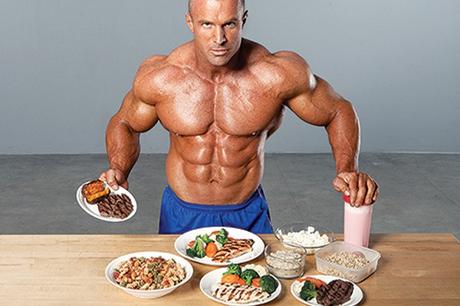
Are you the type of person that never eats before exercise? If so, do you often become tired and irritable half way into your workout? If you answered yes to those questions this article is for you! Unfortunately, you are not alone! There are millions of athletes and casual exercisers who mistakenly believe that eating a meal prior to exercise has no benefit and could possibly hurt their performance. They are mistaken! In fact, eating a meal before working out serves three important functions: helps prevent low blood sugar which leads to symptoms such as light-headedness, fatigue, blurred vision, and indecisiveness; helps settle the stomach and absorb gastric juices; and fuels your muscles with carbohydrates in protein, which is used for energy and muscle building (Clark, 2009). Know that the only time a pre work out meal can damage performance is when too much food is consumed too fast and/or the wrong types of foods are eaten.
So what exactly are you supposed to eat pre workout? Glad you asked! Not only am I going to tell you what to eat pre workout to help you maximize performance, but also how much to eat in regards to protein, carbohydrates, fat, etc. And just to clarify, this article on pre workout nutrition is mostly geared to the casual exerciser and bodybuilder exercising for 60 minutes or less, not aerobic endurance athletes. Aerobic endurance athletes require a different pre workout nutrition plan due to their high need constantly supply of carbohydrates.
Carbohydrates
During high intensity exercise, carbohydrates are the body's primary source of energy that is used for fuel. Think about an automobile. Without gasoline, the car starts to halt and putter, and eventually shuts down altogether. This is similar to what your body can do when it is in a state of starvation! Without the proper fuel to keep you going during high intensity exercise, your body is unable to take on the task at hand and will probably shut down. Notice how I used the term "high intensity" exercise. During high intensity exercise, such as weightlifting and sprinting, the body must use carbohydrates for energy, as fat will simply not provide the energy that is required. However, during low intensity physical activity, such as walking and every day normal activities, fat is a suitable source of energy to provide fuel for the body.
OK let's get to the meat and potatoes of pre workout meal! Nancy Clark, best-selling author of Nancy Clark's Sports Nutrition Guidebook, recommends eating 0.5 grams of carbohydrates per pound of body weight one hour pre workout, or 2 grams of carbohydrates per pound of body weight four hours pre workout. For a 140 pound female, this is 70 grams of carbohydrates pre workout or 280 grams of carbohydrates 4 hours pre workout. Now, this may sound like a lot to you! Trust me, it's not! Consider this:
- 1 large banana contains approximately 32 grams of carbohydrates
- 2 cups of cooked oats, instant or regular, contains approximately 50 grams of carbohydrates
- 2 slices of whole wheat bread contains approximately 40 grams of carbohydrates
- 2 cups of apple juice contains approximately 58 grams of carbohydrates
- 1 cup of whole almonds contain approximately 28 grams of carbohydrates
- 1 large apple contains approximately 31 grams of carbohydrates
- 1 whole wheat bagel contains approximately 47 grams of carbohydrates
- 1 cup of Yoplait fruit flavored yogurt contains approximately 46 grams of carbohydrates
Protein
Protein, or more accurately amino acids, is an extremely important part of the pre workout meal. Many studies have shown that pre workout protein is beneficial to anyone looking to gain muscle and lose fat because the delivery of amino acids is much greater during a bout of exercise than after exercise. This concept directly opposes the premise protein after a workout is more important for gaining muscle. Since these opposing beliefs exist, I and many others simply consume protein pre workout AND post workout. Consuming approximately 10 to 20 grams of protein 1 hour prior to workout will fuel your body with plenty of amino acids to help gain muscle and lose fat. Additionally, a slow digesting protein, such as casein or meat, is best to consume an hour before workout since it is long-lasting. On the other hand, if you can only ingest protein minutes before a workout, choose whey protein instead since it is fast absorbing and will act faster than casein.
Examples of protein sources to consume pre workout:
- yogurt
- almonds
- trail mix
- lentils
- peanut butter
- lean turkey
- lean chicken
- whey protein powder
- casein protein powder
Although highly debated and more of a nutritional supplement, caffeine has been and still is a popular pre exercise supplement, and can be added to the pre workout meal for additional performance benefits. Not only does caffeine provide energy, but it also stimulates the brain leader to enhanced concentration, which can ultimately benefit your workout (Clark, 2009). The majority of studies have revealed that caffeine does indeed enhance performance for both longer lasting, endurance and short-term, high intensity activities (Clark, 2009). Additionally, according to Dr. Larry Armstrong, an exercise physiologist, caffeine does not lead to dehydration and is fine for athletes as long as it is taken in moderation (Clark, 2009). Unfortunately, some people may be negatively affected by the effects of caffeine, thereby suffering from nausea or "coffee stomach." It is best to start with a small amount of caffeine pre workout to see how your body reacts to it. For those of you who do not react negatively to caffeine and wish to reap its benefits, aim for approximately 1.5 milligrams per pound of body weight 1 hour pre workout.
Final Note
An adequate pre workout meal is extremely beneficial for anyone looking to gain fat and lose muscle. Aim for a small or light meal an hour prior to workout or a larger meal 4 hours before workout. In both cases, an adequate amount of carbohydrates and protein should make up the bulk of the meal. This way, you can rest assured that your workout will be sufficiently fueled thereby maximizing performance benefits and post workout benefits. Many studies have proven that a pre workout meal, consisting of protein and carbohydrates, can maximize performance and enhance muscle growth and fat loss. Additionally, if taken in moderation, caffeine can significantly enhance energy and concentration when included in the pre workout meal. Prolab caffeine is an excellent choice if you are looking for a cheap, natural source of caffeine. Also, DPS Nutrition typically has a vast amount pre workout and post workout supplements offered at exceptional prices. As always, consult your physician before starting any nutritional supplementation or exercise regimen.
Source



COMMENTS ( 1 )
posted on 03 September at 18:53
Hey there, You've done a great job. I will definitely digg it and personally suggest to my friends.
I am sure they'll be benefited from this website.